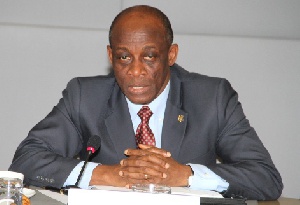Some economic analysts are not impressed by government’s decision to use the entire US$1billion Eurobond to refinance maturing short-term domestic debts as against using the funds to finance infrastructure, which has been government’s long-held position.
Finance Minister Seth Terkper last Friday told journalists that the newly issued Eurobond will be used to refinance maturing domestic debts as part of government’s efforts aimed at extending its debts maturity profile while easing interest payments.
Initially, government had received Parliamentary approval to raise US$1.5bn from the market; out of this amount there was a World Bank guarantee for US$1bn that was to be used to refinance domestic debts, while the remaining US$500m was to be used for capital projects.
“We issued US$1bn because of market conditions… In line with our original agreement, we are going to use the entire US$1bn to refinance domestic debts only,” Mr. Terkper said after government had accepted a 10.75 percent coupon on its 15-year bond.
But Dr. Nii Kotei Dzani, Chief Executive Officer of Ideal Finance, said government’s approach to debt management is not good enough; describing the situation as a “robbing Peter to pay Paul” approach.
“I don’t have any problem with government borrowing to undertake development, but if you look at the rate of borrowing of this country, the money [Eurobond] will be used to settle debt. How long can we continue to do this? We are just robbing Peter to pay Paul. It is about time we looked at our borrowing and took a proactive decision to curtail it,” he told the B&FT in an interview.
Dr. Dzani’s worrying observation comes after government was accused of clandestinely using the last US$1bn Eurobond before this year’s to settle its indebtedness to the Bank of Ghana, which had then financed government’s deficit.
Although the books of the Finance Ministry and the central bank confirm that proceeds from the Eurobond were never used for capital projects as intended, the Finance Ministry had always denied the allegation.
However, the ministry is yet to state which projects the 2014 Eurobond was used to finance.
New debt approach
Mr. Kenneth Kwamina Thompson, Managing Director of Dalex Finance, reiterated the stance of credit ratings agency Moody’s -- which said the country’s B3 rating reflects adverse debt dynamics as highlighted by an increasing debt burden due to large fiscal imbalances and a sharp weakening of the country's currency, combined with reduced debt affordability stemming from high cost of funding in the domestic market.
He argued that government’s strategy “must now move to how we will repay our debts by either increasing income or cutting expenditure, or both. We do not have the luxury of time. We either make the hard decisions now or we will be forced to make harder decisions in the future.”
Dr. Dzani also advised government to work hard at increasing its revenue base by “expanding the tax net so that there will be more revenue to support development projects, because we cannot continue borrowing to pay debt. I don’t know which economy-model supports that idea”.
Investment advisor and Managing Director of InvestCorp Sampson Akligoh, commenting on the debt management strategy said: “What I see from this strategy is the need for Ghana to manage its existing debt stock, which is quite different from borrowing new money for capital spending. Under this condition it is quite difficult, but refinancing strategy helps only to the extent that it can lengthen Ghana’s maturity profile and also lower the cost of debt servicing’.
According to him, if managers of the economy can clearly decouple the elements of managing existing debt and any additional borrowing, then the argument remains: “We should tap the Eurobond market to finance capital projects which can on their own help to generate future cash flow for debt servicing and principal repayments”.
Costly Eurobond
Indeed, the International Monetary Fund (IMF), just like many other analysts, has expressed worry about yields on the latest Eurobond -- which was the country’s third time in as many years.
The 15-year maturity period accepted by government is the longest ever achieved by a sub- Saharan African country outside of South Africa; but the issue also has the distinction of offering the highest yield ever by a sovereign borrowing from the region, notwithstanding a partial guarantee from the World Bank.
But Mr. Terkper told journalists in his ministry's first meeting with the press after the Eurobond issuance that the bond remains central to government's debt sustainability plans.
He said government is shying away from borrowing from the short-term domestic money market to finance its capital projects. As part of government's debt management strategy, it will be looking at long-term finance for its infrastructural projects, Mr. Terkper said.
Business News of Thursday, 29 October 2015
Source: B&FT













